Becoming a book editor isn’t just about having a keen eye for typos; it’s about shaping stories into their best possible versions. It combines passion, skill, and a bit of know-how, and if you wonder how to become a book editor, you’re in the right place.
So, how to become a book editor? This question might have crossed your mind if you’ve ever lost yourself in a book, only to surface with ideas on how it could be even better. Whether you’re dreaming about working with the next big novelist or helping undiscovered writers find their voice, this path is for those who live and breathe literature.
Let’s walk through this together, shall we? From the basics of getting started to the insider knowledge that comes with experience, consider this your friendly guide into the editing world.
How to Become a Book Editor
Becoming a book editor is about more than just loving books and reading. There is a certain set of skills that you need besides love of stories and good knowledge of grammar.
Let’s take a closer look:
Get the Right Education
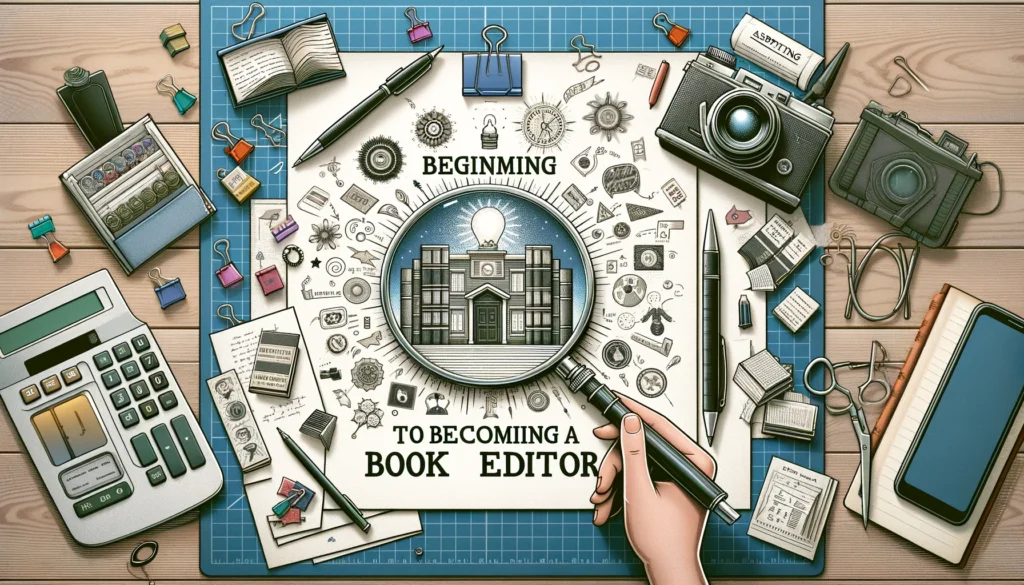
When you’re thinking about becoming a book editor, one of the first steps is figuring out what kind of education you might need.
It’s not all about spotting mistakes or knowing your grammar inside out (though, of course, that helps!). A lot of it comes down to understanding the nuts and bolts of storytelling, how books are put together, and what makes writing stand out.
Now, you might be wondering, “Do I need a specific degree?”
Well, the short answer is, it’s not a must, but it sure can help.
Degrees in English, Literature, Journalism, or even Creative Writing give you a solid foundation. These subjects dive deep into analyzing texts, understanding narrative techniques, and refining your own writing skills—all super important for an editor.
But it’s not just about the degree; courses and certifications in editing specifically can be a game-changer.
Look out for programs offered by universities or professional organizations like the Editorial Freelancers Association or the Society for Editors and Proofreaders.
These courses can teach you the technical side of editing, such as using editing software, understanding publishing processes, and even the business side of freelancing if that’s the route you want to take.
In a nutshell, while there’s no one-size-fits-all answer to getting the ‘right’ education for book editing, arming yourself with knowledge in related fields and specific editing skills can really set you on the right path.
It’s all about building a strong foundation in understanding what makes good writing and how to polish a manuscript until it shines.
Gain Experience
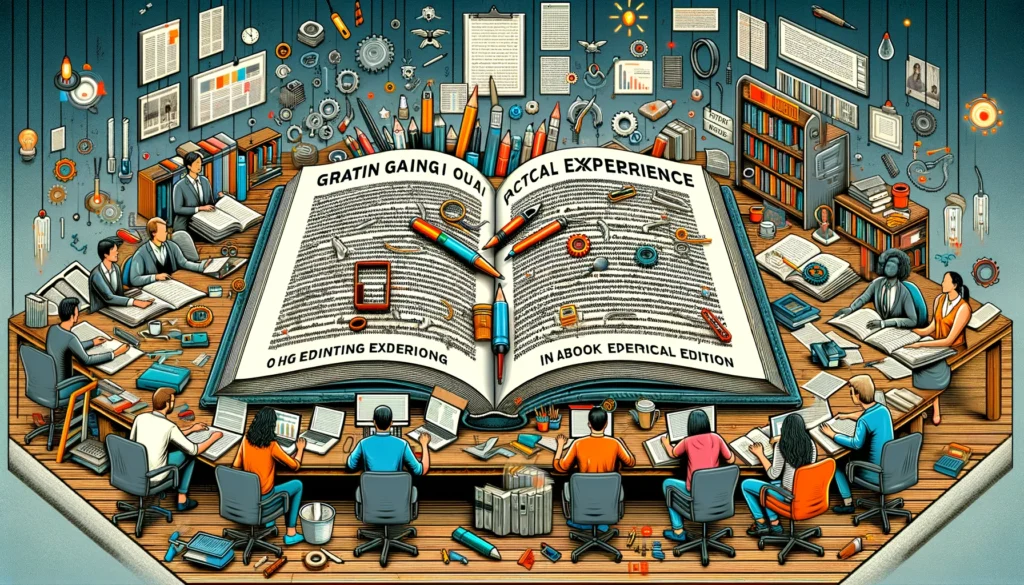
Here’s the thing: no education is substitute for real, hands-on experience. You can read about it and understand the mechanics, but you won’t really get it until you hop on and start editing yourself.
That’s where internships, volunteer work, or landing an entry-level position in publishing come into play.
Internships are gold. Whether it’s at a big publishing house or a small literary magazine, they give you a peek behind the curtain. You’ll get to see firsthand how the editing process works, from manuscript submission to the final print. Plus, you’ll learn by doing, which is invaluable.
You might start with small tasks, but it’s all part of understanding the bigger picture.
Don’t overlook volunteer work, either. Many literary organizations, festivals, and even indie publishers look for volunteers to help with editing and proofreading.
It’s a fantastic way to gain experience, especially if you’re flexible with your time and eager to get involved.
And then there’s the entry-level job route. Positions like editorial assistant or junior editor can be stepping stones to more advanced editing roles.
Yes, you might be doing a lot of administrative work to start with, but you’ll also be in the perfect position to learn from more experienced editors. It’s all about soaking up as much knowledge and experience as you can.
Gaining practical experience is about putting yourself out there and taking advantage of opportunities to learn the craft of editing. It’s about building your skills, sure, but also about making connections and understanding the industry from the inside.
Remember, every bit of experience counts and gets you one step closer to your dream job as a book editor.
Build Your Network

Building your network is super important in the publishing world. Think of it this way: the more people you know, the more you learn and the more opportunities you might come across. It’s all about connecting with others who share your passion for books and editing.
First off, social media and online platforms are great places to start. LinkedIn, for example, is fantastic for professional networking. Follow companies you admire, join groups related to publishing, and don’t be shy to engage in discussions. Twitter can also be surprisingly useful for keeping up with editors, publishers, and writers. Many professionals share insights, job openings, and tips on these platforms.
Attending workshops, seminars, and conferences is another smart move. These events are not only great for learning but also for meeting people face-to-face. Even if the idea of networking sounds a bit daunting, remember that everyone there has a common interest: books and publishing. It’s a shared starting point, which makes initiating conversations a bit easier.
Don’t forget about joining professional organizations related to editing and publishing. Groups like the Editorial Freelancers Association (EFA), the Society for Editors and Proofreaders (SfEP), or local writers’ guilds offer not just resources for honing your craft but also directories, forums, and events where you can meet others in the field.
Lastly, never underestimate the power of a good old-fashioned email. If you admire someone’s work, whether they’re an editor, publisher, or writer, let them know. A polite and genuine message asking for advice or expressing admiration for their work can open doors. Just be respectful of their time and express your interest in learning from their experiences.
Building your network is about being proactive, genuine, and open to learning from others. It’s a crucial step in establishing yourself in the book editing world, so take it one connection at a time.
Develop Essential Skills
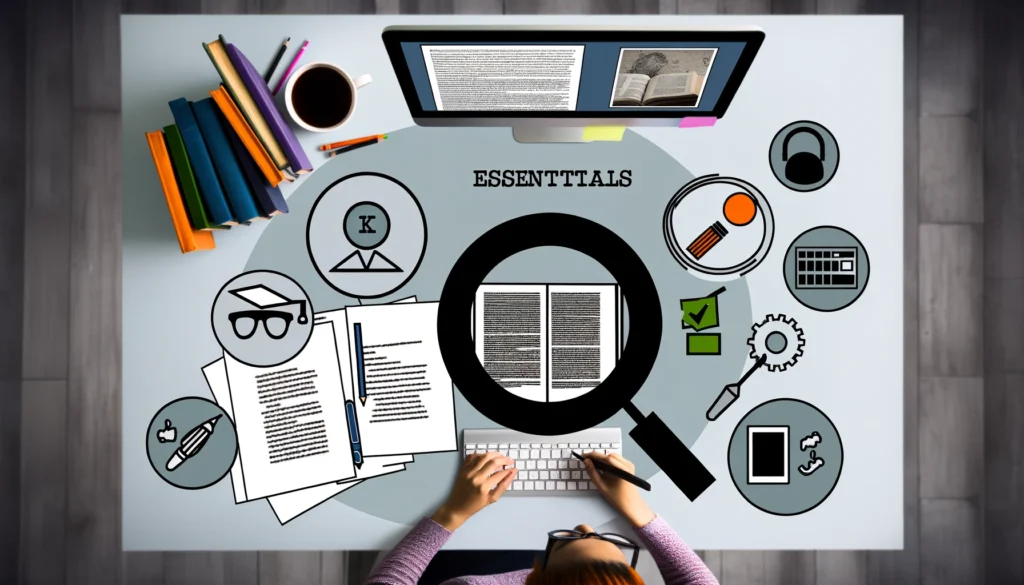
A big part of an editor’s job boils down to a few essential skills that can make or break your success in the field.
First and foremost, strong language skills are non-negotiable. This means having a firm grasp on grammar, punctuation, and spelling, of course, but it goes beyond just spotting errors.
It’s about understanding the rhythm and flow of language, how to maintain an author’s voice while making the text as clear and engaging as possible.
Attention to detail is another must-have. Editing isn’t just a cursory read-through. It’s diving deep into the text, catching inconsistencies, questioning facts, and even noting when a character’s eye color inexplicably changes halfway through the book.
This level of detail ensures the manuscript is polished and professional.
Then, there’s the knowledge of publishing software. Whether it’s Microsoft Word’s Track Changes, Adobe’s InDesign, or other specialized editing software, being tech-savvy can streamline the editing process.
It’s not just about making changes but also about communicating those changes effectively to authors and publishers.
In addition to these, having a solid understanding of the genre you’re editing can be incredibly helpful. Knowing what a manuscript should look like in terms of structure, pacing, and character development for its genre helps you guide authors to strengthen their work.
Developing these skills doesn’t happen overnight, but with practice, feedback, and a willingness to learn, you can build a strong foundation for a successful career in book editing.
Understand the Publishing Process
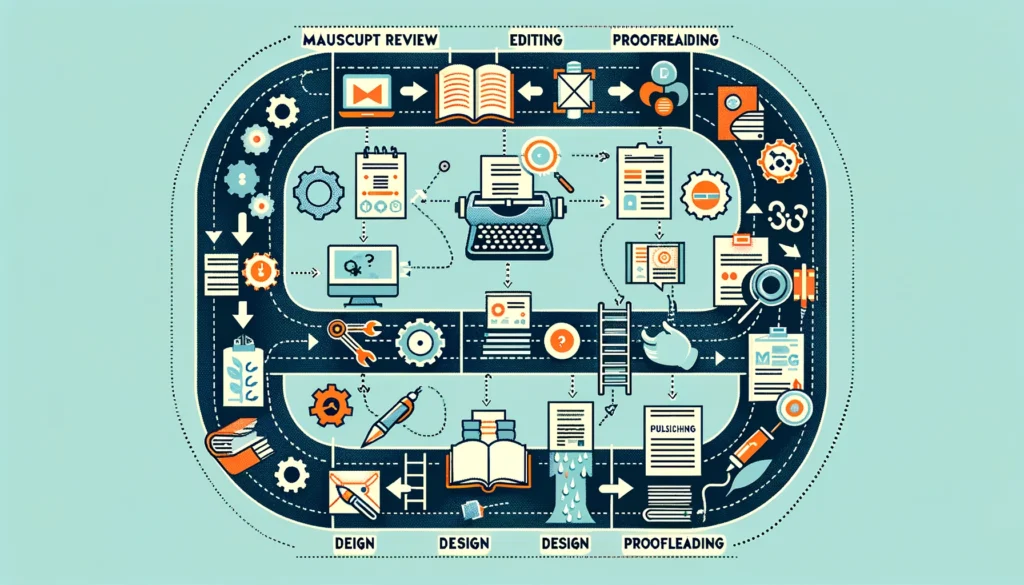
Understanding the publishing process is crucial for any aspiring book editor. Let’s break it down into its main stages.
First up, manuscript submission. Authors submit their manuscripts to publishers, hoping to get noticed. As an editor, this is where you first come in, assessing submissions to see what has potential.
Once a manuscript is accepted, it enters the developmental editing stage. This is where you, as an editor, work closely with the author to refine their story.
You might suggest reorganizing chapters, developing characters further, or cutting unnecessary sections. It’s all about making the manuscript the best it can be.
Next is copyediting. This phase focuses on grammar, punctuation, fact-checking, and consistency. It’s the detail-oriented part of the process where every comma, fact, and spelling is scrutinized.
After the text is polished, it moves on to typesetting and design.
While editors are less involved in this stage, understanding how text layout and cover design impact the reader’s experience is valuable.
Then comes the proofreading stage. After the manuscript is formatted, it’s reviewed one last time. This is the final check for any lingering errors or typos before the book goes to print.
Finally, the book is published. It’s printed, distributed, and marketed to readers.
Even at this stage, editors play a role in marketing strategies and promotional materials.
Understanding this process gives you insight into the lifecycle of a book and the various stages where an editor’s input is invaluable. It’s a complex journey from manuscript to bookstore, and editors are crucial guides every step of the way.
Stay Updated
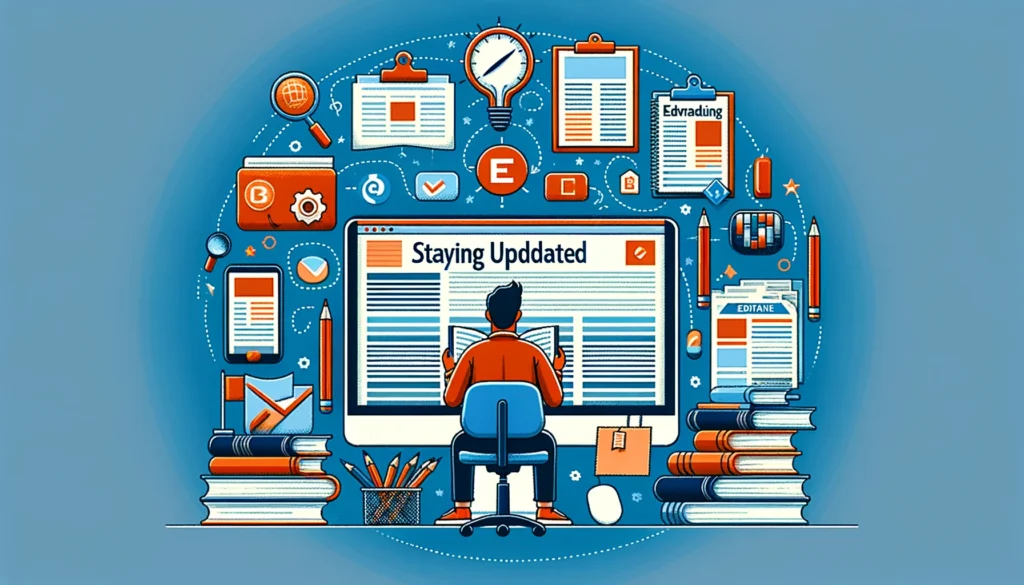
So, why is it so important to keep your finger on the pulse of publishing trends, book markets, and new tools and technologies?
First, understanding the market is crucial. Knowing what a manuscript looks like in terms of current trends can help you guide authors more effectively.
For instance, if a particular genre is oversaturated, you might advise a twist to make a manuscript stand out. Or, if there’s a growing interest in a certain theme or style, you can help authors tap into that.
Second, being aware of new tools and technologies in editing can significantly enhance your efficiency and effectiveness.
From software that helps track changes more smoothly to platforms that facilitate collaboration between authors, editors, and publishers, technology is always evolving.
By staying updated, you ensure that you’re not only keeping up with industry standards but also leveraging tools that can make the editing process more streamlined and enjoyable.
Lastly, the publishing industry itself is constantly changing. New publishers emerge, while established ones might shift their focus.
continues to grow, changing the dynamics of how books are marketed and sold. By keeping an eye on these developments, you can better navigate the industry, advise your authors, and position yourself as a knowledgeable and indispensable resource.
In sum, staying updated isn’t just about keeping your skills sharp; it’s about ensuring you’re well-equipped to help manuscripts shine in a competitive market. It’s about being the best editor you can be, ready to tackle the challenges and opportunities that come with each new trend and technology.
Start Freelancing or Look for Full-Time Positions

If you’re ready to dive into book editing, you might be thinking about whether to freelance or aim for a full-time position. Here’s some straightforward advice on how to approach both paths.
For freelancing, building a strong portfolio is key. Start by taking on a variety of editing projects. This can include anything from editing articles for blogs to volunteering to edit newsletters for non-profits.
Each project you work on adds to your experience and showcases your skills.
Websites like Upwork, Fiverr, and even LinkedIn can be great places to find freelance editing jobs. Remember, every project you complete is a potential testimonial or referral to your next one, so approach each task with professionalism.
On the other hand, if you’re looking for full-time positions, keep an eye on job boards specific to the publishing industry, such as Publishers Marketplace or the Editorial Freelancers Association’s job board.
Networking can also play a significant role in landing a full-time role. Connect with professionals in the industry through online forums, social media, and industry events.
Sometimes, knowing the right person can make all the difference in getting your foot in the door.
Regardless of the path you choose, always continue to learn and improve your skills. The world of book editing is competitive, but with dedication and a willingness to start small and grow, you can build a rewarding career.
Conclusion
Become a book editor combines a passion for books with a keen eye for detail and a commitment to improving each manuscript you touch. It’s about more than just spotting errors; it’s about understanding the heart of storytelling and collaborating closely with authors to polish their work to its finest.
Remember, every book that has captured your imagination went through the careful scrutiny of an editor. If you’re eager to play a part in creating literary masterpieces, then honing your skills, building a strong network, and staying informed about the industry are crucial steps on your path to becoming a book editor.
FAQ
What qualifications do I need to be a book editor?
Becoming a book editor typically requires a strong foundation in language, which can be obtained through degrees in English, Literature, Journalism, or Communications. However, qualifications also include hands-on editing experience, a deep understanding of the publishing process, and familiarity with editing software and styles.
How much do editors for books make?
The salary for book editors can vary widely based on experience, location, and the type of publishing house. Generally, entry-level editors might start with lower salaries, but with experience, editors can expect higher earnings. Freelance editors might charge by the word, page, or project.
How do I become an editor with no experience?
Start by gaining experience through internships, volunteer work, or by editing for small publications and blogs. Building a portfolio through these projects can help you demonstrate your editing abilities to potential employers or clients, even without formal work experience.
Is it hard to become a book editor?
Becoming a book editor can be challenging due to the competitive nature of the publishing industry. Success requires not only a strong command of language and editing skills but also persistence, networking, and continuous learning to keep up with industry standards and trends.
Do editors get paid?
Yes, editors do get paid. Payment structures can vary whether they are freelancing (where they might be paid per word, page, or project) or working in-house at a publishing company (where they would typically receive a salary).
How to become a book editor for a publishing company?
To become a book editor for a publishing company, start by gaining relevant education and experience in editing and publishing. Build your network through internships and professional connections, and keep an eye on job openings at publishing houses to find opportunities that match your skills and interests.
What degree do I need to be a book editor?
While there’s no specific degree required to become a book editor, degrees in English, Literature, Journalism, or Communications are highly beneficial. These programs provide a strong foundation in writing, critical thinking, and language skills essential for a career in editing.
